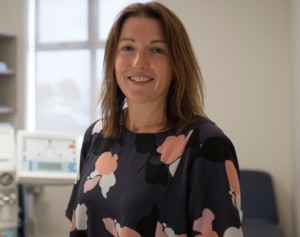
Associate Professor Rachael Walker has been promoted to Professor.
Dr Rachael Walker, a Senior Nursing Lecturer and Associate Professor at EIT | Te Pūkenga, has been promoted to Professor in recognition of her leadership in research, discipline teaching, and service, particularly to the Nursing community.
EIT | Te Pūkenga Executive Lead Chris Collins promoted Associate Professor Walker on recommendation from a Professorial Promotions Panel, consisting of Professor Kay Morris Matthews (Independent Chair), Professor Leonie Schmidt (Otago Polytechnic | Te Pūkenga), Professor Boyd Swinburn (University of Auckland) and Professor Nat Waran (EIT | Te Pūkenga).
Professor Waran, who is the EIT | Te Pūkenga Executive Dean, says: “The panel was impressed by how far Professor Walker had come since completing her PhD – and recognised that she was a quiet but incredibly effective and well respected achiever.”
“We were confident that she has demonstrated the standing that would be impressive within either the Polytechnic or University sector. Congratulations Rachael.”
Mr Collins says he was pleased to accept the Panel’s recommendations as Professor Walker had proven herself in all the criteria needed for promotion.
“We are pleased to have researchers and academics of the calibre of Rachael, who has shown herself to be worthy of this promotion. Her hard work and dedication to her discipline is commendable and she now becomes part of a Professoriate at EIT | Te Pūkenga that has a well-deserved reputation,” Mr Collins says.
Professor Walker thanked the Panel and Mr Collins for the promotion.
“I feel very honoured and privileged to have been promoted to Professor, particularly because I’m quite early in my academic career. It is an honour to be at the same level of other professors I have admired and looked up to including the amazing professors at EIT, across the country and internationally.”
“I also want to thank the people who’ve supported me at EIT and academically, my colleagues nationally and internationally have supported and collaborated with me. This promotion puts me in a standing where I am more in a better position to bring funding to EIT and help develop future researchers in our region.”
“I also have those who have participated in my research to thank. I do a lot of qualitative research, so I’m in a really privileged position where people share their experiences. Some of these are quite difficult to share, but it is important to do so to try and make health service improvement for other people.”
Professor Walker, who is recognised as an international expert in kidney disease, says when she started out in Nursing her goal was to become a Nurse Practitioner.
“I felt that then I could provide more of a holistic and comprehensive service and make care more accessible to patients and address equity by becoming a Nurse Practitioner.”
“I moved into research because I could see that there were issues within the health system that I couldn’t solve in my clinic. These issues needed evidence from research – and also really strong recommendations to health services and policymakers about how we can improve service.”
Professor Walker completed her PhD in Medicine at the School of Public Health, University of Sydney in 2018. She lectures postgraduate nursing students and is an academic mentor for Nurse Practitioners and Registered Nurse Prescribers. She is lead chair for the Nursing Council Nurse Practitioner Panel process and works one day per week clinically at the kidney department at Hastings hospital.
A research highlight for Professor Walker is having an article she co-authored with colleague and EIT | Te Pūkenga Māori and Indigenous Research Professor David Tipene-Leach, published in the prestigious journal, Nature Reviews Nephrology.
“It was an invited review about equity and kidney disease. Personally, I think my biggest achievement is having some of my research make positive change for people within the health sector.”
